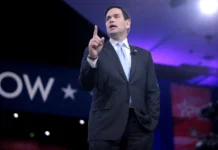Despite some of its public statements, the Iranian regime is clearly hoping for a victory by former U.S. vice president and current presidential Democratic candidate Joe Biden, though this doesn’t mean that Iran will immediately enter into negotiations or that it will reduce its regional aggression afterwards, Israeli observers have said.
“The Iranians declare all off the time that for them, it doesn’t matter who will be elected. For them, Biden and [U.S. President Donald] Trump are both problematic. They say that the U.S. activates pressure on Iran, and that sanctions have harmed the Iranian people,” Col. (res.) Udi Evental, a senior research fellow at the Institute for Policy and Strategy at the Interdisciplinary Center in Herzliya, told JNS.
But aside from its public messaging, “they very much hope that Biden will win,” he added.
Whoever wins the U.S. presidential elections will likely encounter an Iranian demand to return to the 2015 nuclear deal, known as the Joint Comprehensive Plan of Action (JCPOA), as well as compensation for Iran for the economic harm done to it, said Evental.
The reports have mentioned Iranian directives to the militias to restrain themselves, while also seeing Iran itself decrease provocations in the Gulf region.
“The idea is to avoid giving Trump an excuse to act against them, which could change the direction of polls,” said Evental.
On Oct. 11, Iranian-backed Iraqi militia factions declared a suspension of rocket attacks on U.S. forces in Iraq “on condition” that the Iraqi government presents a timetable for a U.S. withdrawal.
‘Everything is frozen until after the elections’
Professor Uzi Rabi, director of the Moshe Dayan Center for Middle Eastern and African Studies at Tel Aviv University, concurred, saying “it’s clear that in principle, there are people in the Iranian regime who wish and maybe even pray that it is Biden they meet after the elections.”
Rabi said the Islamic Republic has had “a good experience with Democratic Party and with Biden as vice president when the JCPOA was formulated. This was very comfortable for Iran. The agreement let Iran do what it considered vital without violating the JCPOA.”
Iran is also “preparing the ground diplomatically, through lobby groups and other organizations working on its behalf, to pass on lots of hints that agreements with it can be reached,” said Rabi, adding that such messages are deceitful. “These are things they don’t at all plan on doing.”
Rabi said that in the event of a Biden victory, he hopes that the Democratic candidate will “stand on guard” in negotiations with Iran and apply lessons learned from the 2015 deal. The Iranians, for their part, are planning to immediately resume trade with Europe, he said, and are using relations with China as a bargaining chip.
“Iran has been sitting on the fence for a number of months and not responding to incidents that they otherwise would have responded to. Everything is frozen until after the elections, after which things will look different,” he said.
Evental shared the assessment, saying Iran’s calculation of attempting to avoid giving Trump a late surge has led to its reduction in regional confrontational steps.
In regard to the Iranian nuclear program, Tehran has been violating the JCPOA by accumulating uranium far beyond the permitted quantity, according to Evental, but in a calculated and cautious manner. “They are in violation, but they haven’t enriched uranium to 20 percent,” he said. “They are not bursting forward in their nuclear program. Rather, they are taking gradual, measured, steps.”
After the elections, in the event of a re-election victory by Trump, it is unlikely that the Iranians will “crawl back to the negotiations table,” said Evental, despite assessments by the Trump administration that Iran cannot absorb another four years of punishing sanctions.
“I’m not at all sure they will do that,” he said. “I believe that if Trump wins, the Iranians will first return to their own maximum pressure campaign. We have seen that in the past, this involves attacking oil tankers with limpet mines and attacks on Saudi infrastructure.
“They will move forward on their nuclear program. They could increase tensions in the region, believing that this will create bargaining chips for negotiations,” he continued. “And in the end, they will want to return to negotiations, but not from a position of weakness.”
‘If Iran prefers Biden, Hezbollah does as well’
In the event of a Biden victory, it remains unclear how a Democratic administration would reach an agreement with Iran. “Will Biden give up on sanctions? Even if he does so, Iran could still demand compensation. In addition, Iran possesses research-and-development capabilities on advanced centrifuges in violation of the agreement. How does that get rolled back?” he asked.
No less importantly, Iran is scheduled to hold presidential elections in June, pointed out Evental, and by all accounts, a hardline conservative is likely to replace President Hassan Rouhani. The legislative elections, held in February, produced a landslide victory for the conservatives. “It is not clear that Iran can make dramatic decisions on the nuclear program because we don’t know whether the Iranian Supreme Leader [Ayatollah Ali Khamenei] will allow Rouhani—a kind of lame-duck president—to do so,” explained Evental. “Iran may not be able to make significant elections until its own elections in June.”
Hezbollah, for its part, is deeply engaged with Lebanon’s internal economic-political crisis, as well as its ongoing tensions with Israel, and threats to retaliate for the death of one of its operatives in a reported Israeli strike in Syria in July.
“If Iran prefers Biden, Hezbollah does as well,” stated Evental.
Iran’s economic distress has led to a moderate reduction in Iranian funding of Hezbollah, estimated at around $700 million per year, he said, and “if Iran manages to escape sanctions pressure, that will also serve Hezbollah. It is therefore synchronized with Iran in terms of its preferences for the U.S. elections outcome.”


























